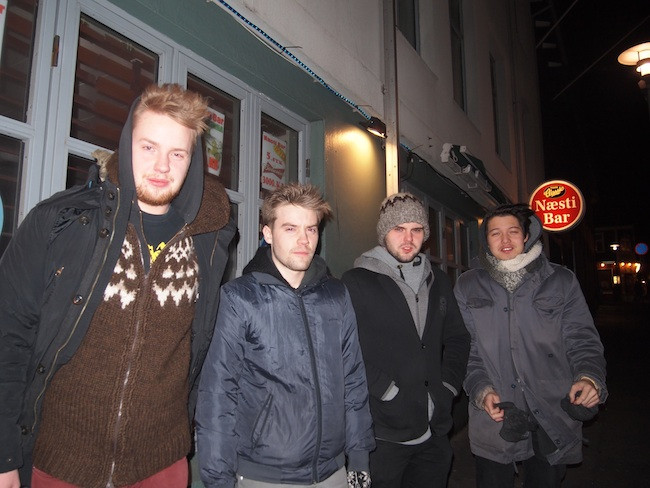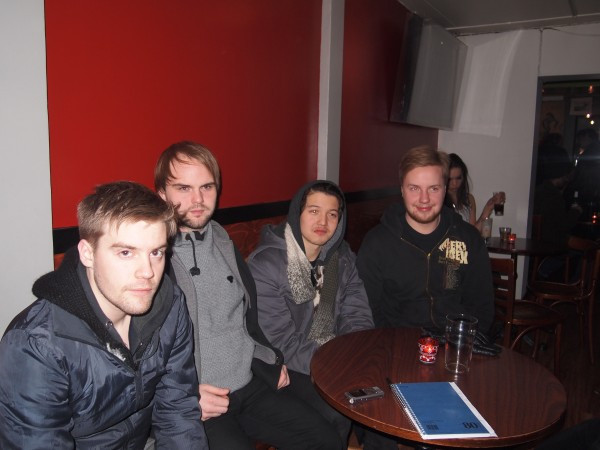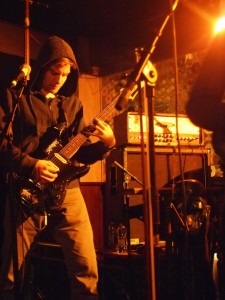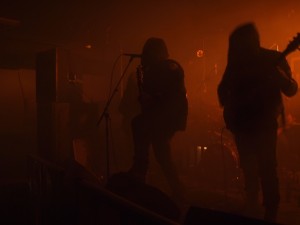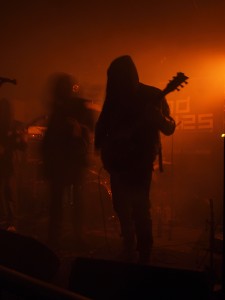EDITOR’S NOTE: In May I got on an impulsive kick and wrote about as many Icelandic metal bands as I could find. One of them was Gone Postal, a band who won the Wacken Metal Battle contest in Iceland in March, which gave them the right to perform at Wacken Open Air this summer. Another was Svartidauði, a black metal band whose debut album Flesh Cathedral was recently released n the U.S. by Daemon Worship Productions. I didn’t know there was a connection between these two bands, but as you’ll see, there is.
Which brings me to the thoroughly awesome Gemma Alexander, a Seattle writer and NCS fan who visited Iceland this fall, timing her visit to coincide with the Iceland Airwaves festival. While in Iceland, Gemma generously arranged to conduct interviews of some Icelandic bands for NCS. So far, we’ve posted her interviews of Angist, Beneath, Kontinuum, and Sólstafir. And today, we give you her interview in Iceland of the following members of Gone Postal:
Nökkvi G. Gylfason (guitar), Ævar Örn Sigurðsson (bass), Þorbjörn Steingrímsson (Vocals, guitar), Stefán A. Stefánsson (drums), and the band’s manager.
Unless otherwise noted, Gemma took all the photographs accompanying. Be sure to read Gemma’s blog about her entire Icelandic trip here.
_____________________________________________________________________
Gone Postal closed Iceland Airwaves’ heavy metal showcase at Amsterdam, turning the decent little bar into something unholy with their atmospheric, blackened-death sound and a few sticks of incense. After the show, Amsterdam staff swept up broken glass while the four members of the band loaded up their gear. A man who introduced himself as their manager grilled me on my journalistic credentials and then hit me up for weed.
Somewhere around 3 am we ended up in a side-street bar where we tried to hear each other over the din. Conducting an interview during rúntur on Airwaves weekend was not necessarily my brightest idea, but between a fuzzy recording and notes scribbled in the dark, I’m pretty sure that what follows is actually what was said.
NCS: Facebook says you got started in 2007, but you guys are very young to have been around that long. Can we get a timeline?
Stefán: Okay, so yeah, 2007 we gathered around in the garage, our first rehearsal space and we were just basically playing whatever came to mind. So we started out as kind of a grindcore, I don’t know, kind of …
Þorbjörn: Death metal something.
Ævar: And something melodic.
Þorbjörn: So we just started as a garage band and played basic metal, and then we released an album called In the Depths of Despair.
Nökkvi: Yeah, we released it ourselves because we were very young, like 18, 17, something.
Stefán: It was 2008.
Nökkvi: Yeah, because in Iceland metal bands have never been really known for releasing full-length albums, they kind of [do] split[s]. So we just said, “Hey, let’s record an album.” It’s not really worthwhile, but it had loads of potential, I think. That was in 2008, in December.
Stefán: December dismember.
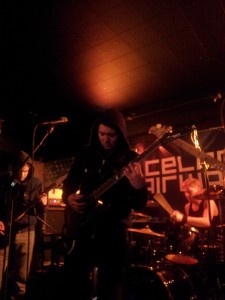 NCS: And what have you been doing since then?
NCS: And what have you been doing since then?
Stefán: We’ve just been writing new songs.
Ævar: Just been like progressing towards some…
Þorbjörn: Our music has more black metal influences now.
Stefán: Obviously.
Þorbjörn: We wrote like bunch of songs, and we recorded a full-length album, another, but we weren’t…
Nökkvi: We recorded another album in 2010, a follow-up to this one but we still haven’t released it. We weren’t really satisfied with the whole recording process. The stuff you heard tonight would be on our third album. I don’t know if the other one will ever be released.
Ævar: No.
Þorbjörn: No.
Nökkvi: It sounds like a bad…We just weren’t really satisfied with the sound, how it came together.
Þorbjörn: That album is kind of the missing link between the old stuff and the stuff we are doing now.
NCS: And the stuff you’re doing now, have you recorded that?
Nökkvi: No.
Þorbjörn: No. We are gathering songs.
NCS: Do you have a schedule or plans?
Nökkvi: Ahh, I think December we’ll be ready. December, January.
Þorbjörn: We’re gonna be super…. I don’t have the word.
Stefán: Productive.
Þorbjörn: And then of course we played Wacken, which was a big deal; first gig outside of Iceland.
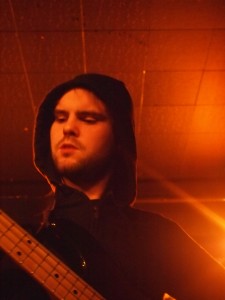 NCS: Was that from the Metal Battle? Was it this year?
NCS: Was that from the Metal Battle? Was it this year?
Ævar: Yeah, yeah.
Nökkvi: This year.
NCS: And then you did some other shows in Europe as well?
Þorbjörn: Yeah, we played one in Denmark.
Ævar: Yeah that was a show.
Stefán: That was a real show.
Þorbjörn: That was a great show.
NCS: On the web, it looks like you’ve had a lot of turnover in your lineup.
Þorbjörn: Well, it was mostly bass players.
Nökkvi: We’ve been actually pretty steady since 2008, the four of us.
Ævar: I came in late.
Nökkvi: And then we had another guitar player, which was from Australia, and he didn’t really suit the band’s direction or something, and we didn’t really like talking English in practices.
Þorbjörn: Yeah, we started out as a five piece and I was only on vocals then, but then we dismissed our guitarist and I took over the guitar.
Manager: Like a pro. Like a pro.
NCS: You want to tell me a little bit about Wacken.
Þorbjörn: It was a cultural shock.
Nökkvi: Because it was a…There were a lot of like, German people like 40 plus, older German people. It was weird. But we had a great time, it was awesome. Treated like a…
Ævar: Except the mud.
Stefán: You know it’s raining all day and the ground turns into…
Nökkvi: It was a great experience. A high point in the band’s career.
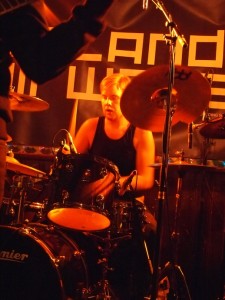 NCS: I couldn’t find your album online to buy.
NCS: I couldn’t find your album online to buy.
Nökkvi: Oh that’s uh,
Þorbjörn: That’s kind of our fault.
Ævar: We’re just lazy promoting ourselves.
Nökkvi: First album was released by a local label that did nothing. It didn’t get any distribution.
Stefán: No, they just fucked us in the ass.
NCS: And I guess even though it was years ago, that’s the only product you have.
Þorbjörn: Yeah, it doesn’t really showcase any of the band’s potential, I think. So uh, just write down that nobody should check us out and then listen to the album.
NCS: Nobody should listen to your album. That’s the first time I’ve ever heard a band say that.
[They laugh.]
NCS: Somewhere out on the internet it says you’re “about to release” an album called Spearheading the Umbragious.
Ævar: That’s the album we’re not going to release, that’s the second one.
Þorbjörn: On our Wikipedia?
NCS: I think actually it’s myspace.
Nökkvi: I think we have a myspace…
Þorbjörn: We haven’t checked it out.
Nökkvi: I don’t think anyone uses it anymore.
Þorbjörn: We’re just on Facebook barely.
Manager: They’re nowhere.
NCS: Okay, you are a strictly live act.
Þorbjörn: Ah, yeah.
Ævar: That’s the way to put it.
Stefán: Strictly live.
Manager: They’re not internet savvy.
Þorbjörn: We just like getting stoned. And playing music. That’s about it.
NCS: Is getting stoned the trigger for the change from grindcore to the sound you’ve got now?
Nökkvi: I wouldn’t limit anything just to cannabis you know but, yes. And drugs are an inspiration to all human beings.
Þorbjörn: Also just influences and music.
Stefán: Lots of drugs. [They laugh.]
NCS: So tell me about the music that’s been influencing you.
Nökkvi: We all have very different musical backgrounds. This guy is into…
Ævar: I listen to a lot of jazz and, yeah, and all kinds of music.
Þorbjörn: Progressive, alternative,
Ævar: Progressive, yeah.
Nökkvi: I don’t know how to simplify it but we all are kind of from different musical tastes. Kind of odd. When we’re writing songs it’s really important we have a filter of all riffs and everything. We know what to expect from each other when writing.
Þorbjörn: A lot of influence also comes from, like, post-rock.
Nökkvi: Yeah, yeah, post-rock.
Þorbjörn: There we get this atmospheric …
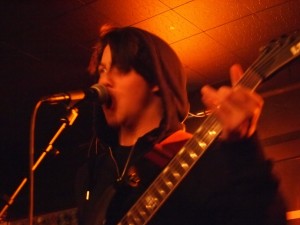 NCS: Post-rock is a genre that people define differently. What are some examples of what you guys mean by it?
NCS: Post-rock is a genre that people define differently. What are some examples of what you guys mean by it?
Nökkvi: God Speed You Black Emperor is the fucking [Icelandic] – that’s my definition of post-rock. But I’m not, you know…
Þorbjörn: Yes, that’s a good example.
Ævar: A lot of stuff.
Nökkvi: Epic shit, you know.
Stefán: Atmospheric stuff.
Nökkvi: Old soundtracks. Blue Sunshine.
Þorbjörn: Movie music!
Nökkvi: Movie music, freaky shit. And the basic blackened death metal, I guess. Ruins of Beverast, this is something we all like very much, they’re German.
NCS: A lot of bands start out as black metal purists and over time other influences creep in. But you guys have gone the opposite direction.
Þorbjörn: Yeah.
Ævar: Yeah, that makes sense.
NCS: So how did that happen?
Stefán: Probably when he [Nökkvi ] started playing in Svartidauði, which were the first to play at Amsterdam tonight.
Nökkvi: That might have been some influence.
Ævar: A black metal band.
Þorbjörn: You know Svartidauði?
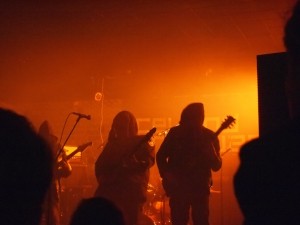 NCS: Yeah, I saw them tonight.
NCS: Yeah, I saw them tonight.
Nökkvi: I joined Svartidauði in 2009, or something.
Þorbjörn: That’s probably when the black metal influences were, like, coming, sliding in.
NCS: Are you still involved?
Nökkvi: In Svartidauði? [He gives me a dumbfounded look.]
NCS: Yeah, you know I didn’t see the faces.
Nökkvi: Oh, yeah, yeah, obviously.
NCS: Are you the only one in another project, or do you all do other things too?
Nökkvi: Right now I think…
Þorbjörn: You are the only one right now.
Ævar: Well, I play in like a cover band. We play like a bunch of pop songs for money.
Stefán: He’s a sell-out.
Ævar: Yeah, I’m kind of a sell-out. But I like it. And he [Stefán] used to be in a band called Munnriður – don’t write that down.
NCS: I don’t think I could.
Þorbjörn: We [pointing to Stefán] both were in a band called Orsök that was like this semi-post-rock-hardcore band.
Nökkvi: Yeah, so we’re all kind of musically linked. Svartidauði and Gone Postal, they rehearse together at the same place so it’s all family – black metal mafia of Iceland.
NCS: So you guys kind of talked a little bit about writing. You started in the garage and jammed it out.
Þorbjörn: Yeah, in the garage it was like someone brought a riff, we played it four times then we played another riff and so on. It was just like this: riffs and riffs and riffs. But now it’s more like…
Stefán: It has to float. Everything has to float. If it doesn’t,
Þorbjörn: If it doesn’t float naturally
Stefán: It’s just wrong, there’s something wrong with it.
Nökkvi: It’s what we realized after playing together for three, four years. It has to float.
Þorbjörn: Before, we wrote like a new song every week or so. Every gig we played a new song. But now we really have to put our hearts
Nökkvi: We spend three or four months writing one song which we may throw away to make another one. The standard’s way higher.
Þorbjörn: And also we started recording all our sessions when we’re practicing and then we later listen to it and just
Ævar: Continue working.
Stefán: We listen to it and make adjustments in our heads. So when we get back together we have a more clear image of what we’re playing. It’s a great way to make a song.
NCS: Do you want to talk a little about Svartidauði too?
Nökkvi: Ah yeah, go ahead and ask. The singer was here like 15 minutes ago…He’s probably gone somewhere. I’ll answer you the best I can.
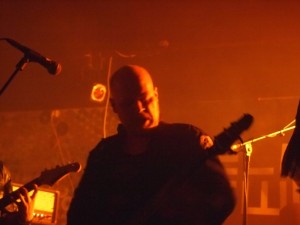 NCS: How about just a quick outline of who started it and where did you come in?
NCS: How about just a quick outline of who started it and where did you come in?
Nökkvi: I think it was the vocalist who started it in like 2002-3 something. And went through some lineup changes before the Temple of Deformation was recorded; it was the demo released in 2006. Then after that some minor changes again, myself and a new drummer came in, followed by Those Who Crawl and Slither Shall Again Inherit the Earth demo which led to the album that will be out in days, I think. But the vocalist knows more about the origins.
NCS: So how long has the current lineup been the lineup?
Nökkvi: Since 2009, I’d say.
NCS: It seems like every Icelandic metal band has a member whose been in Svartidauði – like it’s a rite of passage to be involved in that project.
Nökkvi: I understand. There’s been a lot of good musicians in Svartidauði.
NCS: On Facebook, the genre is listed as Heimsendarokk. What’s that mean?
Stefán: Doomsday rock.
Nökkvi: “The world’s end” rock.
NCS: Facebook also says Svartidauði is based in the suburb Kópavogur. Is there a lot of Satanism in the suburbs of Reykjavík?
Nökkvi: That depends you know on how you define Satanism, you know. There can be a lot of Satanism, yes, there can also be non-existing…
NCS: Imaginary Satanism?
Nökkvi: Yeah.
NCS: Relative to other Icelandic bands, Svartidauði has a lot more theatrical approach. Is that …
Nökkvi: Yeah, that’s intentional. It’s probably the same kind of aspect of music we have [in Gone Postal]. You know, we ourselves don’t like to go to a show where the band is doing sound check three minutes before counting into a song. It’s a show. You go to a theater, you don’t expect people to act like the show hasn’t started or anything. So it’s definitely intentional, to set us apart from other bands as well because our aim is to put up a show, not just, “Yeah, great band playing.” It’s a fucking show.
NCS: How do Icelanders tend to react to that?
Nökkvi: Our shows? Luckily, we don’t do much shows in Iceland anymore. Two times a year maybe, even less.
NCS: Are you playing someplace else or not playing live much?
Nökkvi: You know Iceland doesn’t really have much more to offer. You know the band’s been active for eight years, or something. It just doesn’t really apply to us, you know “Yeah, let’s go to a bar, play a gig.” We’d rather do something special, on occasion. We’re playing Nidrosian Black Mass in Belgium in February, and this summer we played Deathkult in Germany. And we went to Norway. We played in Berlin as well.
NCS: You said the album is out in days, but I think it was scheduled by now.
Nökkvi: Yeah, there are constant delays you know, in the musical world.
NCS: It’s not out yet so you don’t know about response…
Nökkvi: Yeah, we had a preview available from the label, and I think I’ve seen 6 reviews so far with a near 100%. It’s been described as really trippy shit, which it truly is.
********
EDITOR’S NOTE: Check out Gone Postal’s complete set at Wacken here. And this is the title track from Svartidauði’s new album:

